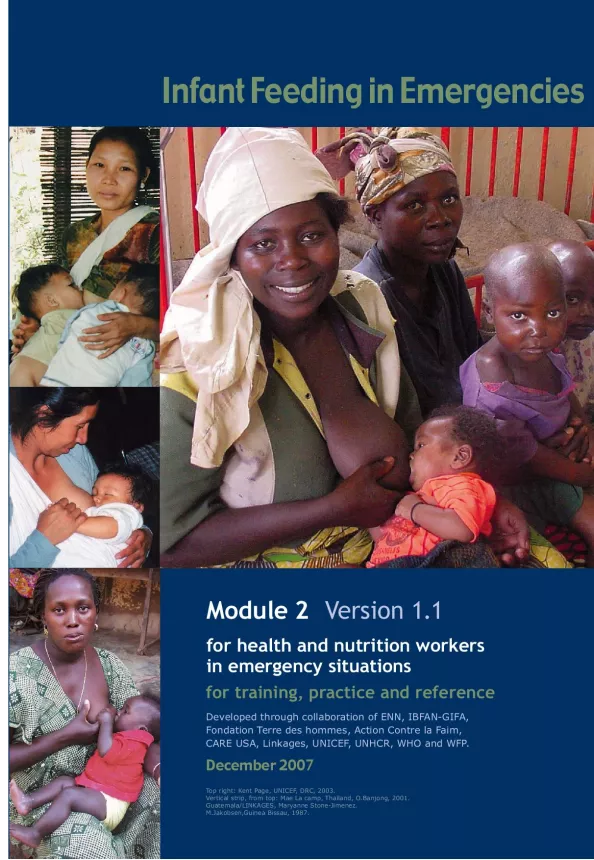Infant Feeding in Emergencies (IFE) Module 2, Version 1.1 (2007)
Publication details
For health and nutrition workers in emergency situations.
Module 2 has been developed through interagency collaboration and consultation with many experts and field workers. Version 1 was produced in December 2004. Version 1.1 (December 2007) has been updated by the IFE Core Group with regard to key references, infant feeding and HIV, and to reflect the latest version of the Operational Guidance on IFE (v2.1, Feb 2007). Version 1.1 update and the translation into French was funded by the IASC Nutrition Cluster.
Module 2 comprises four parts - a core manual, additional material (including sections on artificial feeding and management of acute malnutrition in infants under six months), annexes and slides content. These are available to download seperately or as a complete document.
Summary
Module 2 aims to provide those directly involved with infants and carers with the basic knowledge and skills to support safe and appropriate infant and young child feeding. It contains special chapters, in the additional material booklet, on relactation and the management of breast conditions. Additional material also covers the management of severely malnourished infants less than 6 months as well as artificial feeding (reflecting realities in the field and in the context of a lack of guidance on these 2 issues).
Note: The information has been simplified and streamlined, so that health and nutrition workers with little time and little opportunity for study can learn and use effective interventions with the minimum of training. It is extremely important to stress that this training cannot replace a week-long training course in breastfeeding counselling. Field staff should ideally complete a full breastfeeding counselling course as it includes important practical information and clinical sessions and also allows time to assimilate both technical and relationship skills required for good counselling. Module 2 was designed to specifically address emergency situations when time for full training is scarce. Ideally, in emergency situations, fully trained national and/or international staff in breastfeeding counselling should be brought in to oversee work and to continue the training process.
Target audience: Health and nutrition workers directly concerned with care of mothers/caregivers and infants. It provides specific practical knowledge about how to help individual mothers and caregivers.
Time for training: Those studying module 2 should have already studied module 1, and should have module 1 manual available for reference. Module 2 consists of five core parts, which can be covered in 5 hours of group teaching. Additional parts can be studied or taught separately. If included with the core part, the entire session would take a full day.
Both Modules I and II are also available in print or on CD-ROM from the Emergency Nutrition Network (ENN), 32, Leopold Street, Oxford, OX4 1TW, UK. Tel: +44 (0)1865 324996, Fax: +44 (0)1865 324997, E-mail: ife@ennonline.net

